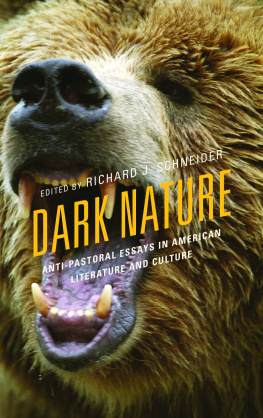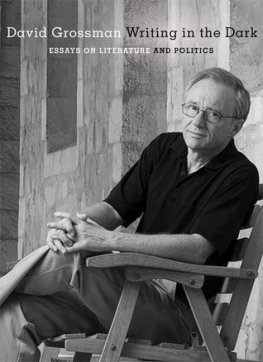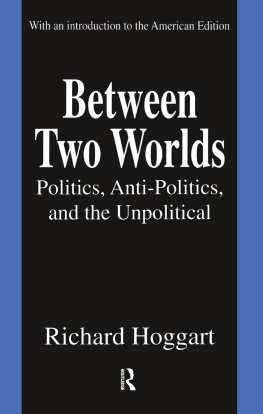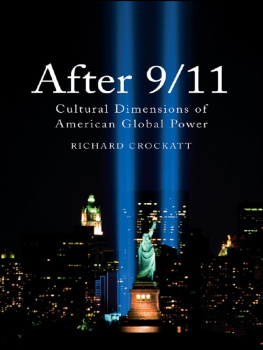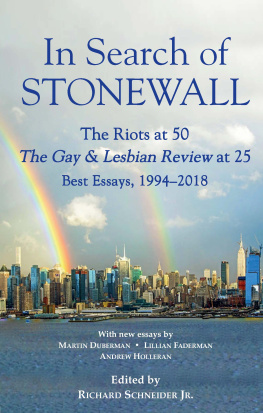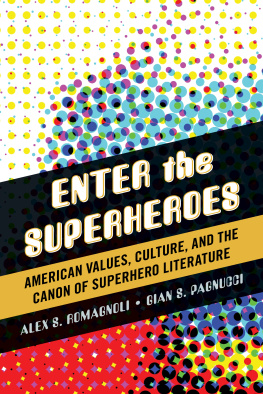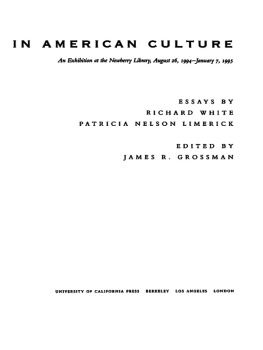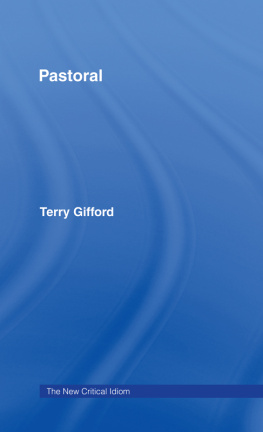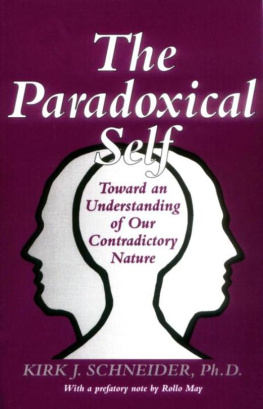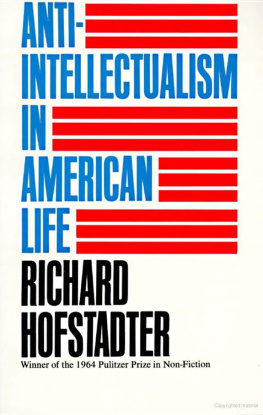Schneider Richard - DARK NATURE: anti-pastoral essays in american literature and culture
Here you can read online Schneider Richard - DARK NATURE: anti-pastoral essays in american literature and culture full text of the book (entire story) in english for free. Download pdf and epub, get meaning, cover and reviews about this ebook. City: LANHAM, year: 2018;2012, publisher: Lexington Books, genre: Art. Description of the work, (preface) as well as reviews are available. Best literature library LitArk.com created for fans of good reading and offers a wide selection of genres:
Romance novel
Science fiction
Adventure
Detective
Science
History
Home and family
Prose
Art
Politics
Computer
Non-fiction
Religion
Business
Children
Humor
Choose a favorite category and find really read worthwhile books. Enjoy immersion in the world of imagination, feel the emotions of the characters or learn something new for yourself, make an fascinating discovery.
- Book:DARK NATURE: anti-pastoral essays in american literature and culture
- Author:
- Publisher:Lexington Books
- Genre:
- Year:2018;2012
- City:LANHAM
- Rating:4 / 5
- Favourites:Add to favourites
- Your mark:
- 80
- 1
- 2
- 3
- 4
- 5
DARK NATURE: anti-pastoral essays in american literature and culture: summary, description and annotation
We offer to read an annotation, description, summary or preface (depends on what the author of the book "DARK NATURE: anti-pastoral essays in american literature and culture" wrote himself). If you haven't found the necessary information about the book — write in the comments, we will try to find it.
DARK NATURE: anti-pastoral essays in american literature and culture — read online for free the complete book (whole text) full work
Below is the text of the book, divided by pages. System saving the place of the last page read, allows you to conveniently read the book "DARK NATURE: anti-pastoral essays in american literature and culture" online for free, without having to search again every time where you left off. Put a bookmark, and you can go to the page where you finished reading at any time.
Font size:
Interval:
Bookmark:
Dark Nature
Ecocritical Theory and Practice
Series Editor: Douglas A. Vakoch, California Institute of Integral Studies, USA
Advisory Board:
Joni Adamson, Arizona State University, USA; Mageb Al-adwani, King Saud University, Saudi Arabia; Bruce Allen, Seisen University, Japan; Hannes Bergthaller, National Chung-Hsing University, Taiwan; Zlia Bora, Federal University of Paraba, Brazil; Izabel Brando, Federal University of Alagoas, Brazil; Byron Caminero-Santangelo, University of Kansas, USA; Jeffrey J. Cohen, George Washington University, USA; Simo Farias Almeida, Federal University of Roraima, Brazil; Julia Fiedorczuk, University of Warsaw, Poland; Camilo Gomides, University of Puerto RicoRio Piedras, Puerto Rico; Yves-Charles Grandjeat, Michel de Montaigne-Bordeaux 3 University, France; George Handley, Brigham Young University, USA; Isabel Hoving, Leiden University, The Netherlands; Idom Thomas Inyabri, University of Calabar, Nigeria; Serenella Iovino, University of Turin, Italy; Adrian Ivakhiv, University of Vermont, USA; Daniela Kato, Zhongnan University of Economics and Law, China; Petr Kopeck, University of Ostrava, Czech Republic; Mohammad Nasser Modoodi, Payame Noor University, Iran; Patrick Murphy, University of Central Florida, USA; Serpil Oppermann, Hacettepe University, Turkey; Rebecca Raglon, University of British Columbia, Canada; Anuradha Ramanujan, National University of Singapore, Singapore; Christian Schmitt-Kilb, University of Rostock, Germany; Marian Scholtmeijer, University of Northern British Columbia, Canada; Heike Schwarz, University of Augsburg, Germany; Murali Sivaramakrishnan, Pondicherry University, India; Scott Slovic, University of Idaho, USA; J. Etienne Terblanche, North-West University, South Africa; Julia Tofantuk, Tallinn University, Estonia; Jennifer Wawrzinek, Free University of Berlin, Germany; Cheng Xiangzhan, Shandong University, China; Yuki Masami, Kanazawa University, Japan; Hubert Zapf, University of Augsburg, Germany
Ecocritical Theory and Practice highlights innovative scholarship at the interface of literary/cultural studies and the environment, seeking to foster an ongoing dialogue between academics and environmental activists.
Recent Titles
Dark Nature: Anti-Pastoral Essays in American Literature and Culture, edited by Richard J. Schneider
Ecological Crisis and Cultural Representation in Latin America: Ecocritical Perspectives on Film, Literature, and Art, edited by Mark Anderson and Zelia Bora
Coexistenialism and the Unbearable Intimacy of Ecological Emergency, by Sam Mickey
Ecocritical Approaches to Italian Culture and Literature: The Denatured Wild, edited by Pasquale Verdicchio
Dark Nature
Anti-Pastoral Essays in
American Literature and Culture
Edited by Richard J. Schneider
LEXINGTON BOOKS
Lanham Boulder New York London
Published by Lexington Books
An imprint of The Rowman & Littlefield Publishing Group, Inc.
4501 Forbes Boulevard, Suite 200, Lanham, Maryland 20706
www.rowman.com
Unit A, Whitacre Mews, 26-34 Stannary Street, London SE11 4AB
Copyright 2016 by Lexington Books
All rights reserved. No part of this book may be reproduced in any form or by any electronic or mechanical means, including information storage and retrieval systems, without written permission from the publisher, except by a reviewer who may quote passages in a review.
British Library Cataloguing in Publication Information Available
Library of Congress Cataloging-in-Publication Data Available
ISBN 978-1-4985-2811-5 (cloth : alk. paper)
ISBN 978-1-4985-2813-9 (pbk. : alk. paper)
ISBN 978-1-4985-2812-2 (electronic)
 TM The paper used in this publication meets the minimum requirements of American National Standard for Information Sciences Permanence of Paper for Printed Library Materials, ANSI/NISO Z39.48-1992.
TM The paper used in this publication meets the minimum requirements of American National Standard for Information Sciences Permanence of Paper for Printed Library Materials, ANSI/NISO Z39.48-1992.
Printed in the United States of America
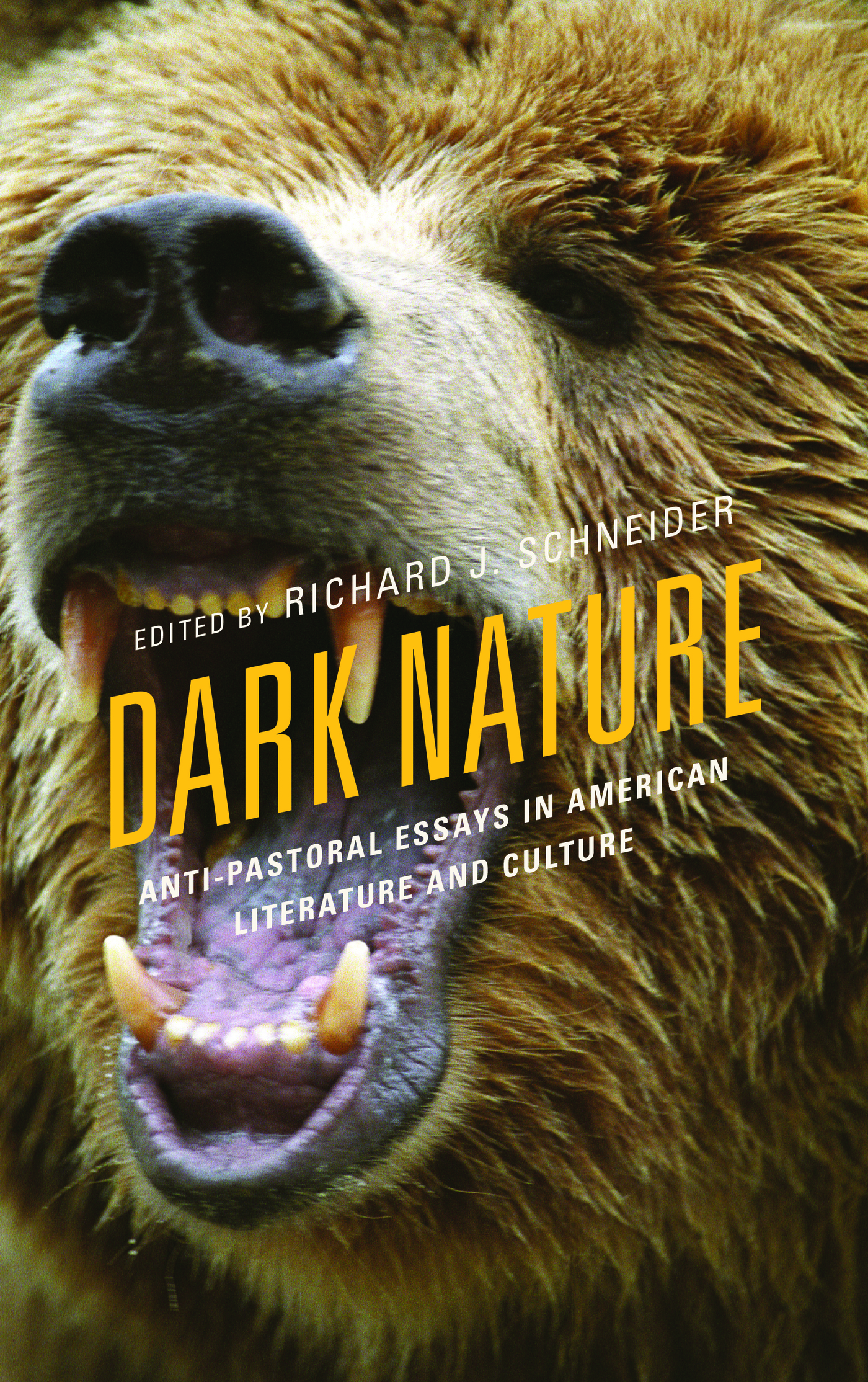
Richard J. Schneider
The serious consideration of nature as more than just background in a literary text began in the 1980s. This first wave of what would soon be called ecocriticism emphasized the genre of literary nonfiction and the importance of wilderness, focusing on British and American literature. A second wave beginning in the mid-1990s expanded ecocriticism to include multiple genres of literature and popular culture, world literatures, urban environments, and special issues such as environmental justice.
More recently a third wave has expanded ecocriticism even further, including, Scott Slovic explains, such concerns as global comparisons of nature in different national cultures on one hand and local bioregionalism on the other, multi-gender issues such as green Queer Theory, and justice for and subjectivity in nonhuman species. To these new concerns we might add the interest in the agency of both nonhuman and non-organic nature expressed in the new materialism.
All of these interdisciplinary permutations of ecocriticism have done much to demonstrate the fields true range and its power to illuminate an almost endless variety of texts (Armbruster and Wallace 3). However, throughout these various waves of change, ecocriticism has continued to be dominated by an essentially pastoral, conservationist, and preservationist sensibility.
According to ecocritic Terry Gifford, the pastoral perspective is essentially idealistic, emphasizing fertility, resilience, beauty, and unthreatened stability in nature (47). It tends to privilege a past when humans were closer to nature, everything was better than today, and there were no problems of everyday living so that one had time to contemplate the meaning of life. It was Arcadia, a Golden Age of imagined perfection, the world of Wordsworth and Thoreau. This pastoral world of nature is a place to visit, but we cant live there; the writer must return from either a literal or an imagined retreat into nature (Gifford 4753). As Thoreau admitted, he lived a sort of border life, on the confines of a world, into which I make occasional and transient forays only (Walking 217).
As Leo Marx pointed out in 1964 in his The Machine in the Garden, the pastoral experience can be a mere sentimental escape or it can be a complex experience that allows the writer to bring back the wisdom found in nature for renewed life both individually and socially (25). In either case the idealization of nature in the pastoral perspective persists in ecocriticism.
Recent anthologies of environmental literature provide a case in point. Michael Branchs excellent anthology Reading the Roots: American Nature Writing Before Walden, includes Captain John Smiths glowing description of New Englands bounty in A Description of New England (1616). The rivers, the ocean and rivers provide, he says, an abundance of fish easily caught: He is a very bad fisher [who] cannot kill in one day with his hook and line, one, two, or three hundred cods (Branch 55). Game too is plentiful: For hunting also: the woods, lakes, and rivers, afford not only chase sufficient, for any that delights in that kind of toil, or pleasure; but such beasts to hunt, that besides the delicacy of their bodies for food, their skins are so rich, as may well recompence thy daily labor, with a captains pay (Branch 55).
Branchs anthology does include a brief excerpt from Smiths description of natures supposed bounty in A General History of Virginia
Font size:
Interval:
Bookmark:
Similar books «DARK NATURE: anti-pastoral essays in american literature and culture»
Look at similar books to DARK NATURE: anti-pastoral essays in american literature and culture. We have selected literature similar in name and meaning in the hope of providing readers with more options to find new, interesting, not yet read works.
Discussion, reviews of the book DARK NATURE: anti-pastoral essays in american literature and culture and just readers' own opinions. Leave your comments, write what you think about the work, its meaning or the main characters. Specify what exactly you liked and what you didn't like, and why you think so.

